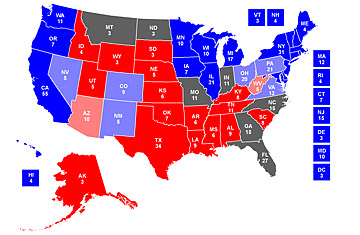
Barring an extraordinary shock, Barack Obama will win more than 270 electoral votes on Tuesday, giving him the White House. Hours before regular voting starts, John McCain has no clear path to reaching that goal.
In fact, interviews with political strategists in both parties and election analysts and advisers to both presidential campaigns — including a detailed look at public and private polling data — indicate that an Obama victory with well over 300 electoral votes is a more likely outcome than a McCain victory.
Under the Electoral College system, a candidate wins all of a state's electoral votes as long as he or she achieves a popular-vote victory of any margin. Obama's commanding position results from the fact that he holds seemingly impregnable popular-vote leads in 24 states, plus the District of Columbia, comprising 291 electoral votes, more than he needs in order to win. Obama's geographic anchors are the Northeast, the mid-Atlantic, the upper industrial Midwest and the West Coast — all areas that Democratic presidential candidates have dominated for several election cycles. But he is also encroaching on states that have recently gone dependably Republican, including Nevada, Virginia and Colorado.
With his superior spending, better organization on the ground, and poll standing, Obama actually seems poised to win the majority of the remaining toss-up states. If there is a pro-Democratic/anti-Bush wave cresting, as some top strategists in both parties believe, Obama could take all of the still contested battlegrounds, which would give him nearly 400 electoral votes and a significant multiregional mandate. The remaining toss-up states are all large ones — Florida, North Carolina, Ohio, Indiana and Missouri — with a total of 84 electoral votes, and all were won by George W. Bush in 2000 and 2004. And some additional Western and Southern states that are currently leaning toward McCain (such as North Dakota and Georgia) could end up in the Democratic column, lifting Obama over 400.
McCain's challenge — and only hope — is to find a way to get just over 270 electoral votes, starting with pulling back into the Republican column some states that appear to be tilting clearly toward Obama. Then he needs to sweep the toss-ups, where in almost every case polling shows him behind. Right now, McCain leads solidly or more narrowly in 21 states with 163 electoral votes.
McCain's most likely victory scenario is to hold nearly all of the states that Bush won in 2004. The Republican's strategists have claimed for several days that they are closing the gaps in many of the traditionally Republican states to within striking distance. Actually overtaking Obama in enough states to win would require a combination of factors: Obama's get-out-the-vote efforts would have to turn out to be weaker than thought; young voters would have to fail to channel their enthusiasm for Obama into actual voting; race would have to be a bigger factor than most pollsters currently believe it to be; conservatives would have to be more fired up than they have seemed; independents would have to be more attracted to the Republican ticket than they have been all year; and most of all, late-deciding voters would have to break disproportionately to McCain.
If all that happens — improbable at this point — McCain could get to 270 by losing all the states Democrat John Kerry won in 2004 but holding all the Bush states, plus taking two from a group that includes Iowa, New Mexico, Colorado and Nevada.
McCain's other path would be to win Pennsylvania — where public polls have shown Obama with a healthy lead but where Republicans have invested a lot of resources. That would allow McCain to squeak to victory, even if he lost Virginia, as long as he won one of the four states above. McCain's Sunday-night visit to New Hampshire suggests that Republicans also see a glimmer of hope in a state that has just four electoral votes but where Obama has pulled to a big lead in polls.
